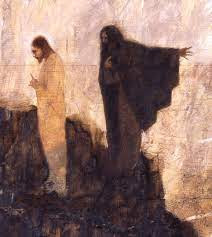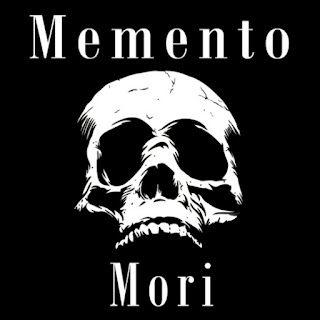February 25, 2024
Mark
8.31-38
+ Every week, without fail, I stand here and talk about “following
Jesus.”
After all, it’s the basis of everything I believe as a Christian.
For me, as you hear me say again and again, being a Christian
equals “following Jesus” or being a “disciple of Jesus”
And I believe that with all my heart.
But…but…what I don’t share with you is how difficult it is for me
to say that.
Because, in fact, it is not easy for me to “follow.”
You know me.
I’m not that guy.
I don’t like taking orders.
I don’t do what people want me to do.
You all figured that out a long time ago.
And I don’t like following anyone.
I’m not used to following.
I find it difficult to follow.
Following, for me anyway, means having to humble myself, having to
slow down. To breath, and to let someone else lead the way.
And I don’t really enjoy that.
I’ll be honest: I kind of like doing my own thing.
It’s like being so used to driving all the time and then finally
having to allow someone else to drive you.
You find yourself sitting in the passenger seat being critical of
the speed of their driving, how they come up a little too quickly to a stop
sign, how they don’t make the turn signal at the right time.
When I let someone else drive, I often find myself pumping that
invisible break on the passenger side sometimes.
For me, that is often the way I feel about following Jesus.
I often, when following Jesus and trying to live out his teaching,
find myself pumping the invisible break on the passenger side.
I’m often asking Jesus, “do you know where we’re going? Because it
seems like we’re just circling the block.”
I often find myself thinking, well, I wouldn’t do it this way.
There are plenty of examples in the Gospels.
Turning the other cheek?
I wouldn’t normally be all right with that.
Loving my neighbor as myself?
If I had the choice not to, I’m not sure I would.
Not that one neighbor, any way.
But this is what it means to follow.
It means that, pump that invisible break as much as we want, it is
not up to us.
We are the followers.
We are the ones who must bring up the rear.
And doing so is humbling and difficult and hard at times.
It means we’re not in control.
And here at St. Stephen’s, where many of us (not just me) have
major control issues, that’s hard for a good many of us.
In today’s Gospel, we find Jesus explaining to us in very blunt
words what it means to be a disciple.
For him, being a disciple, means being a follower.
A follower of him.
And, as we know, because we’re not the ones in control when it
comes to following Jesus, being a Christian—being a follower of Jesus—means
that we are sometimes being led into some unhappy circumstances.
Being a follower of Jesus doesn’t mean closing ourselves up
intellectually.
It doesn’t mean we get to stop thinking for ourselves
Trust me.
I know too many of these kind of Christians.
These are the people who think being a Christian means not having
to think anymore.
Just believing that all will be well and there aren’t any
problems.
I think we all, at times, find ourselves lulled into a false sense
of what it means to be a follower.
We think that being a follower of Jesus means that everything is
going to be happy-go-lucky and wonderful all the time.
We think that following
means not really having to think about bad or difficult things anymore.
It’s easy, after all, to be a lemming.
But that isn’t the kind of following Jesus wants us to do.
The kind of follower Jesus wants us to be is not easy.
For many Christians, they don’t even want to follow Jesus.
They want to worship Jesus.
They want to put Jesus up on an inaccessible altar and worship him.
Because. . .well. . . as you hear me say on a regular basis, it’s
easy to worship Jesus.
It’s safe to worship Jesus.
Worshipping Jesus but not following Jesus feels like Christianity.
Worshipping Jesus makes one feel like a Christian, without
actually having to do anything as a Christian outside of our own safe little insular
world. world.
Christianity is great when you strive to be pious and holy—or at
least look like you’re pious and holy.
But actually following Jesus doesn’t have much to do with being
either pious or holy.
And it sure isn’t safe.
It’s messy. It’s dirty. And it’s hard.
It means doing things we might not really want to do because they make
us uncomfortable.
It means going places we really don’t really want to go.
And it means thinking in a way that oftentimes seems counter to
what we have been taught being a “good” Christian is and should be.
It means not just worshiping Jesus as some inaccessible ideal, but
actually trying to BE like Jesus in this world.
And let’s face it, do we REALLY want to BE like Jesus?
It’s hard to have someone else’s standards essentially be my
standards.
It can be depressing.
Now that doesn’t mean we shouldn’t be joyful in our following of
Jesus.
Yes, we should be filled with a deep and sincere joy.
But, as the old song goes, no one promised us a rose garden.
Nowhere in scripture have we been promised that life is going to be rosy and
sweet all the time.
Being a follower is not always so much fun.
Being a Christian means not always strolling around in comfort and
joy all the time.
As we are reminded in this season of Lent and especially in that
week preceding Easter, being a Christian means following Jesus wherever he
goes.
And where he goes is not to the rose garden.
It is to the garden of Gethsemane—to that place where he too would
be feeling anguish, where he too would sweat blood, where he too would cry out
in anguish to God.
Following Jesus means essentially being like him.
And being like him, means having the same relationships he had.
And when we look at the relationships he had, we realize they were
not normal relationships.
His relationship with God was intense.
For Jesus, God was a parent.
God was “Father,” “Abba!”
But the relationship was even more than that.
It was also almost like lovers.
Jesus loved God.
God loved Jesus.
And that, too, is what our relationship with God should be like,
as followers of Jesus.
We should love God.
Our relationship with God should be intense as well.
It should intimate.
It should be so intense and intimate that other people will say,
“That’s really weird!”
My goal in my relationship with God is that people will say,
“”That’s weird, that relationship Fr. Jamie and God have with each other.”
I used to joke about getting t-shirts made for people saying,
JESUS IS MY BOYFRIEND.
But there is some truth to that.
We should have a deeply intimate relationship with Jesus, in which
such a t-shirt is funny and weird, but kinda true too.
But it should be that intense, because God loves us.
Deeply and intensely.
But it doesn’t end there.
There is also the relationship Jesus had, because of his intense
and deep love of God, with others.
Jesus loved others.
Intensely.
Deeply.
He cared for them.
Jesus loves us.
Intensely.
Deeply.
And because he did, so should we.
Because Jesus loves us, we should love others.
In everything we do as followers of Jesus, we should let love
always be our driving force.
It is that love that makes us feel the anguish he feels.
It is that love that makes us suffer with him.
It is that love that makes us bleed with him.
Following Jesus means not just following him through the moments
of teaching ministry, not just through the miracles he performed.
It means following him through the dark days of his last week,
through the blood and excruciating moments of his dying.
It means that, like him, our love for him causes us take up our
crosses and follow him wherever he might go.
It means paying the anguished price for love!
Jesus knew, as we find in our Gospel reading for today, that there
were certain things he had to do.
He had to “undergo great suffering,” He had to be killed.
He understood that fully.
He in turn tells us that we too must realize that we will have to
bear our share of suffering in this life.
We too will have to take up our own crosses.
The cross is the reminder to us that following Jesus doesn’t just
mean following him through the rose gardens of our lives.
It means, following him all the way to that cross.
It means taking up our own crosses and staggering with him along
that path.
It means sweating blood with him in the garden of Gethsemane.
It means crying out with him in anguish.
It means feeling with him the humiliation and loneliness of being
betrayed—yes, even by one’s own friends and followers, by people we love.
But, it also means following him to the very end.
Just as the cross is a symbol of death and torture and pain—it is,
for us Christians, also the symbol of the temporal nature of those things.
The cross is the doorway to the glory that awaits us beyond the
cross.
The cross is the way we must travel, it is what we must carry, it
is what we must be marked with, if we wish to share in the glory that awaits us
beyond the cross.
I said earlier that no one promised us a rose garden in scripture.
I should revise that.
While we might not have been promised a rose garden, we have been
offered glory.
Glory comes to us, when we follow Jesus.
It comes to us when we let our love for God lead us through the
dark and frightening places this world can throw at us.
If we let that love guide us, if we let ourselves be led by Jesus,
we will find true and unending glory awaiting us.
So, as we encounter the crosses of our lives—and we will—as we
allow our love for God to lead us into places we might not want to go, let us
do so with the realization that glory has been offered to us.
One day, what seems to us a symbol of pain and loss and failure,
will be transformed.
It will be transformed into a crown upon our heads.
And, on that day, there all our pains, all of our sorrows will,
once and for all, be replaced with joy. Amen.








